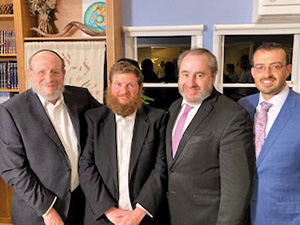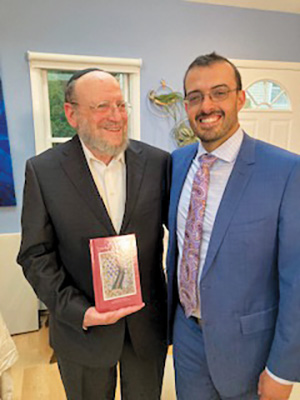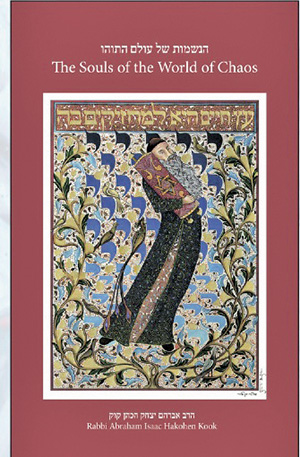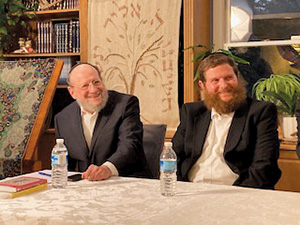
Rabbi Bezalel Naor, author of “Souls of the World of Chaos,” published in 2023 by Kodesh Press, spoke on a recent panel with the rabbinic leadership of Teaneck’s Lev Le’Daas in a discussion moderated by Kodesh Press founder and owner Alec Goldstein. Rabbi Naor’s book spotlights the essay of the same name by Rabbi Abraham Isaac Hacohen Kook, the first Ashkenaz chief rabbi of Israel, known as British Mandatory Palestine in those years.
Rabbi Naor has dedicated much of his life to the study of Rav Kook’s works and outlook. Joining him on the panel were Rabbi Shmuel Braun, Lev Le’Daas’s rabbi; and Rabbi Mark Gottlieb, senior director of Tikvah and founding dean of the Tikvah Scholars Program, formerly head of school at Yeshiva University High School for Boys (MTA).
Goldstein’s thoughtful questions engendered equally thoughtful responses by the panelists, highlighting perspectives on the many messages of Rav Kook. Rabbi Braun noted that Naor’s sefer “… breaks down the complex into the simple, reminding us of the concept that a rebbe is like a father.” Rabbi Gottlieb affirmed this idea, adding, “One [indeed] needs a rebbe to study Rav Kook,” and noting that Rabbi Naor was his rebbe.

Rabbi Braun said that Rav Kook was known for having compassion for all Jews, with all of their diversity. “He could see the beauty that was not obvious to others, perceived the mystical beauty in things and had a love for others.” Rav Kook’s 1913 essay, for which Rabbi Naor’s book is titled, was penned during the era of the second Aliyah, which was composed of young, single and socialist Jews from Russia and Poland, and focused on nationalism more than religion. Rabbi Gottlieb said: “Rav Kook has his own metaphysical map. Beneath the apostasy is what’s beautiful, pure, holy and true, even if a people aren’t aware of it in themselves.”
Rabbi Naor feels that Rav Kook speaks to him in describing the dichotomy of non-religious Jews in the early period of Aliyah, and cited two interpretations. One is that there is a creative impulse to build within people who are ordered, structured and focus on the concept of tikkun. The other, if not channeled, is that people are rebellious or chaotic (tohu), and this condition results in destruction. He cited an example of the former regarding the settlers of the second Aliyah, who were primarily non-observant, but who also carried out the holy work of settling the land. Rabbi Gottlieb said, “Both viewpoints assume metaphysical kabbalah of the cosmos, and that it was the Baal Shem Tov who brought chasidus into the world, in his attempt to identify the nature of the soul.”
 However, noted Rabbi Naor, “Rav Kook is not justifying the non-religious lifestyle” or attempting to glorify non-Jewish religious beliefs; rather he recognized the koach (strength) of “ha-tohu” and its role in driving and affecting tikkun. He further observed that according to Rav Abaye, one of the Amoraim, “orphaning is a process to create seder/order.”
However, noted Rabbi Naor, “Rav Kook is not justifying the non-religious lifestyle” or attempting to glorify non-Jewish religious beliefs; rather he recognized the koach (strength) of “ha-tohu” and its role in driving and affecting tikkun. He further observed that according to Rav Abaye, one of the Amoraim, “orphaning is a process to create seder/order.”
Goldstein then dropped an intellectual bomb of sorts, asking the panel and based on Rav Kook’s work, “Is it defensible to say that souls of chaos are superior to souls of order?” Rabbi Braun responded, “Tohu was created first and experienced the initial higher light, but the power will eventually be given to tikkun.” Rabbi Gottlieb’s response: “A tzadik cannot stand in the place of a baal teshuva, and the purpose of chaos was to be corrected by tzadikus [righteousness.] Zadonus [evil or insolence] transforms to mitzvot.”
Rabbi Naor reminded those assembled that Rav Kook was influenced by Chabad, somewhat of a radical theology. “Antinomianism serves as a basis of mainstream Judaism, where from a ‘rogue’s gallery’ comes Mashiach.” He said that Rav Soloveitchik couldn’t find religious philosophy in Rav Kook, but Rabbi Gottlieb retorted that was too harsh. Rabbi Braun noted that Rav Kook “…didn’t fit” in the vessel of tohu, and that happiness can’t be contained in the vessel of words, yet he was himself a poet who encouraged other poets.
Concluding, Goldstein asks the panel to describe their takeaways from “The Souls of the World of Chaos.” Rabbi Gottlieb shared his perspective that Rav Kook elevates and embraces the world in a holistic sense. However, he also lamented his view that Modern Orthodoxy currently displays a loss of care of the klal, for the gentile world and seems ‘contracted,’ while Rav Kook is universal.
Rabbi Braun pointed to the ‘closedness’ of post-Holocaust hashkafa, the relative non-acceptance or critical view of certain Orthodox customs practiced by some towards others. For this reason, he noted that Rav Kook is truly relevant now because his writings are visionary and speak to the current history and matzav. He referenced the Izhbitzer Rav, Rabbi Mordechai Yosef Leiner, who says that sin is also part of Hashem’s plan, and one has to know that when we fail or fall, it’s also part of the ultimate cosmic plan.

Rabbi Naor concluded that Rav Kook envisioned the integration of all elements. He had a unifying perspective and was an “Ish Kodesh.” He explained that Rav Kook sometimes engaged in “calling Muslims to prayer, yet simultaneously recognized the chaotic passion of children as ‘tal yaldusecha,’ with a focus to bring that passion to service as an adult.” Remarkably, Rav Kook also perceived the sobering parallels between oleh Bavel and the first Aliyah, with similar obstacles then as we have now.
Rabbi Naor’s book, “The Souls of the World of Chaos” can be purchased at Judaica House in Teaneck in person or online at https://www.judaicahouse.net/ or directly from Kodesh Press at https://kodeshpress.com/









